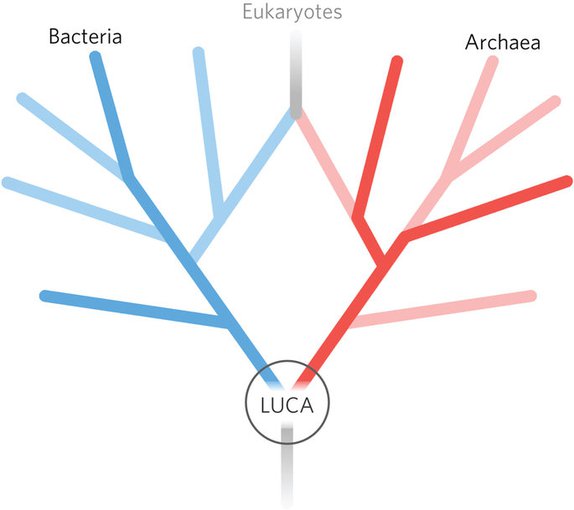Last Universal Common Ancestor, and the Hard Limits of Knowledge
Around 4 billion years ago there lived a microbe called LUCA — the Last Universal Common Ancestor. There is evidence that it could have lived a somewhat ‘alien’ lifestyle, hidden away deep underground in iron-sulfur rich hydrothermal vents. Anaerobic and autotrophic, it didn’t breath air and made its own food from the dark, metal-rich environment around it. Its metabolism depended upon hydrogen, carbon dioxide and nitrogen. Most remarkable of all, this little microbe was the beginning of a long lineage that encapsulates all life on Earth.
Using a variety of methods, biologists have mapped out the tree of relationships between living things across Earth’s long inhabited history, which goes back more than three billion years.
Through these kinds of studies, biologists can trace all of life back to a single kind of organism - LUCA, the Last Universal Common Ancestor.. The basic structures of this entity’s biochemistry, including the use of DNA, are what every form of life on Earth today uses.
We do not know much about this creature. We do not have direct fossils of its existence. But we can infer its existence from the tree of life. There must have been a last universal common ancestor that gave root to all life on Earth.
The recognition of LUCA is a triumph of modern biological sciences. But it is also a horizon beyond which we cannot see. Could there, for example, have been more than one origin of life on Earth? Perhaps there were different versions of self-replicators, but the one leading to LUCA won out. What came before LUCA in its own lineage? LUCA, after all, represents the living form we all descended from, not necessarily the origin of life itself. Like cosmologists pushing further back in cosmic history, biologists must be creative as they seek to move further back in the dim mists of time.
The limits of knowledge:
What’s cool about all this is how it reveals something fundamental about science. Horizons exist because evidence comes with constraints we don’t know how to break. That means that not every direct question can find a direct answer. The trail can simply grow cold, or disappear. At that point, the most interesting question of all arises: What do you do next?
https://astrobiology.nasa.gov/news/looking-for-luca-the-last-universal-common-ancestor/
https://bigthink.com/13-8/limits-of-knowledge-big-bang-origin-life/
Around 4 billion years ago there lived a microbe called LUCA — the Last Universal Common Ancestor. There is evidence that it could have lived a somewhat ‘alien’ lifestyle, hidden away deep underground in iron-sulfur rich hydrothermal vents. Anaerobic and autotrophic, it didn’t breath air and made its own food from the dark, metal-rich environment around it. Its metabolism depended upon hydrogen, carbon dioxide and nitrogen. Most remarkable of all, this little microbe was the beginning of a long lineage that encapsulates all life on Earth.
Using a variety of methods, biologists have mapped out the tree of relationships between living things across Earth’s long inhabited history, which goes back more than three billion years.
Through these kinds of studies, biologists can trace all of life back to a single kind of organism - LUCA, the Last Universal Common Ancestor.. The basic structures of this entity’s biochemistry, including the use of DNA, are what every form of life on Earth today uses.
We do not know much about this creature. We do not have direct fossils of its existence. But we can infer its existence from the tree of life. There must have been a last universal common ancestor that gave root to all life on Earth.
The recognition of LUCA is a triumph of modern biological sciences. But it is also a horizon beyond which we cannot see. Could there, for example, have been more than one origin of life on Earth? Perhaps there were different versions of self-replicators, but the one leading to LUCA won out. What came before LUCA in its own lineage? LUCA, after all, represents the living form we all descended from, not necessarily the origin of life itself. Like cosmologists pushing further back in cosmic history, biologists must be creative as they seek to move further back in the dim mists of time.
The limits of knowledge:
What’s cool about all this is how it reveals something fundamental about science. Horizons exist because evidence comes with constraints we don’t know how to break. That means that not every direct question can find a direct answer. The trail can simply grow cold, or disappear. At that point, the most interesting question of all arises: What do you do next?
https://astrobiology.nasa.gov/news/looking-for-luca-the-last-universal-common-ancestor/
https://bigthink.com/13-8/limits-of-knowledge-big-bang-origin-life/



